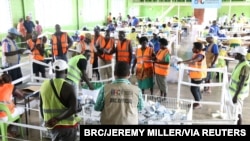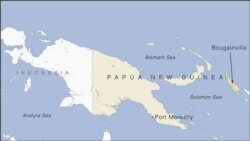Formal talks moderated by the United Nations are to begin Monday in the next stage in Bougainville’s efforts to achieve independence from Papua New Guinea. After years of secessionist conflict and a long peace process, an overwhelming majority of Bougainvilleans voted to breakaway in 2019. Bougainville is north-east of Australia.
97.7% of voters in Bougainville chose to break away from Papua New Guinea in a referendum 18-months ago.
The result highlighted deep-rooted support for independence in Bougainville, a chain of islands almost 1,000 kilometers northwest of Papua New Guinea’s capital, Port Moresby.
But the result was non-binding and experts have said talks beginning Monday and moderated by the United Nations are a significant step.
The negotiations are between Papua New Guinea’s prime minister, James Marape, and Ishmael Toroama, a former rebel fighter. He is the president of the autonomous region of Bougainville, which has its own constitution, government, and public service. But its people want more.
Anthony Regan is from the School of International, Political & Strategic Studies at the Australian National University. He says the people of Bougainville want to become a separate country.
“Bougainville is quite remote from the mainland of Papua New Guinea and has a long history of feeling isolated and separate," he said. "Culturally and linguistically, it is closer to the neighboring Solomon Islands than to most of the rest of Papua New Guinea. Skin color of Bougainvilleans is generally very dark — far darker than generally the case for the rest of PNG and that skin color is associated with a sense of Bougainville identity.”
The independence referendum marked a crucial stage of a peace agreement signed 20 years ago.
The 2001 Bougainville Peace Agreement ended a conflict that raged between 1988 and 1997 that lead to the deaths of about 20,000 people, or about 10% of Bougainville’s population.
The island has rich resources, and once had the world's largest open-cut copper mine.
Disputes over those valuable resources, land rights and environmental damage played a key part in the island's long civil war between the Bougainville Revolutionary Army, Papua New Guinean forces and other pro-PNG militias.
The process towards independence has no official time frame and could take years. A final decision rests with lawmakers in the Papua New Guinea parliament.
Analysts have said the PNG is eager to avoid independence in Bougainville because of fears it could inflame secessionism in other parts of a disparate country.
PNG has a population of about 10 million people, and more than 850 different language groups.









